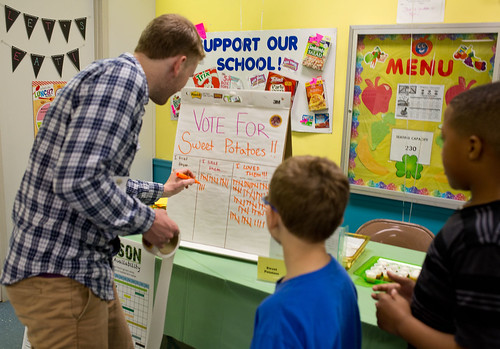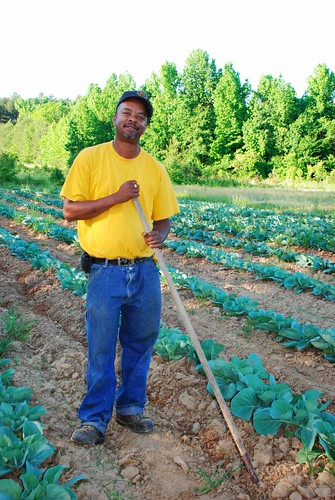
Rural communities are looking for innovative ways to sustain quality of life and build viable food systems that support the health and economic needs of their people. Working Landscapes is a Warrenton, N.C. nonprofit that creates sustainable food hubs by bridging the gap between local farmers and area consumers. As a 2015 USDA Farm to School grantee, Working Landscapes uses its food hub resources to link local farmers and northeastern North Carolina school districts, demonstrating that working together can make a difference in the quality of life for rural communities.
By Tim Williams, Program Manager, Working Landscapes
The lights are on and the machines whirring on a recent June morning in downtown Warrenton, N.C. From the outside, the former cotton gin warehouse doesn’t look like much, but what you find behind the historic facade is an innovative farm to school venture that is bringing locally grown, fresh-cut vegetables to students across the northeastern part of the state.
This particular batch of vegetables is headed to Beaufort County Schools. The district has placed an order for 150 cases of chopped collard greens to wash, cook, and freeze. Beaufort School Nutrition Director, Gwyn McBride, said “Our students will enjoy every bit of the greens next school year. Having access to a locally grown and easy to use product is very convenient and we are looking forward to serving our students local produce.”
The Chopped Produce Initiative is a project of Working Landscapes, a nonprofit organization based in Warren County, N.C. The project, which received a support service grant from the USDA Farm to School Grant Program in 2015, offers fresh-cut vegetables to school districts during fall and winter to boost the local agricultural economy, contribute to the revitalization of downtown Warrenton, and most importantly, offer school children fresh, locally grown vegetables. The initiative works with three small-scale producers in Warren County. In partnership with FoodCorps North Carolina, the group helps farmers build farm safety plans and prepare for annual Good Agricultural Practices audits conducted by the USDA.
Support from the USDA Farm to School Program has enabled the project to significantly increase purchases from local farmers and reach more students. Since November 2014, the Chopped Produce Initiative has purchased over 25,000 pounds of produce, reached nearly 19,000 students in seven school districts, and grown over 500 percent in sales from the previous year.
Chopping produce isn’t the only thing Working Landscapes does to bring the farm to school. School districts that participate in the Chopped Produce Initiative also have the opportunity to take part in What’s Growing On?, an educational program that promotes local, seasonal produce in cafeterias, classrooms, and communities across northeastern North Carolina.
What’s Growing On? materials help extend local food programming beyond the Chopped Produce Initiative’s processing season. Cafeteria posters and classroom lessons keep students engaged throughout the year. These resources teach students about the seasonality of fresh fruits and vegetables, local food systems concepts, and regional agricultural food products.
Working Landscapes is growing a farm to school community from seed in the region. The organization builds supply chains that support small farmers, brings agricultural processing back to a rural downtown, supplies cafeterias with local and healthy produce, and educates kids about their food.
The initiative would not be possible without the organizations and institutions that have supported the project from the beginning. Funders and partners include Blue Cross Blue Shield of North Carolina Foundation, Warren County Government, Warren County Cooperative Extension, the North Carolina Department of Agriculture, as well as the Winston Salem Foundation. These partners have helped cover the costs of equipment, supplies, and operations as the project grows towards financial sustainability.




